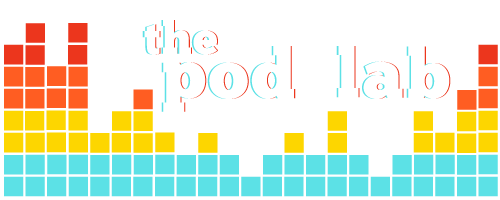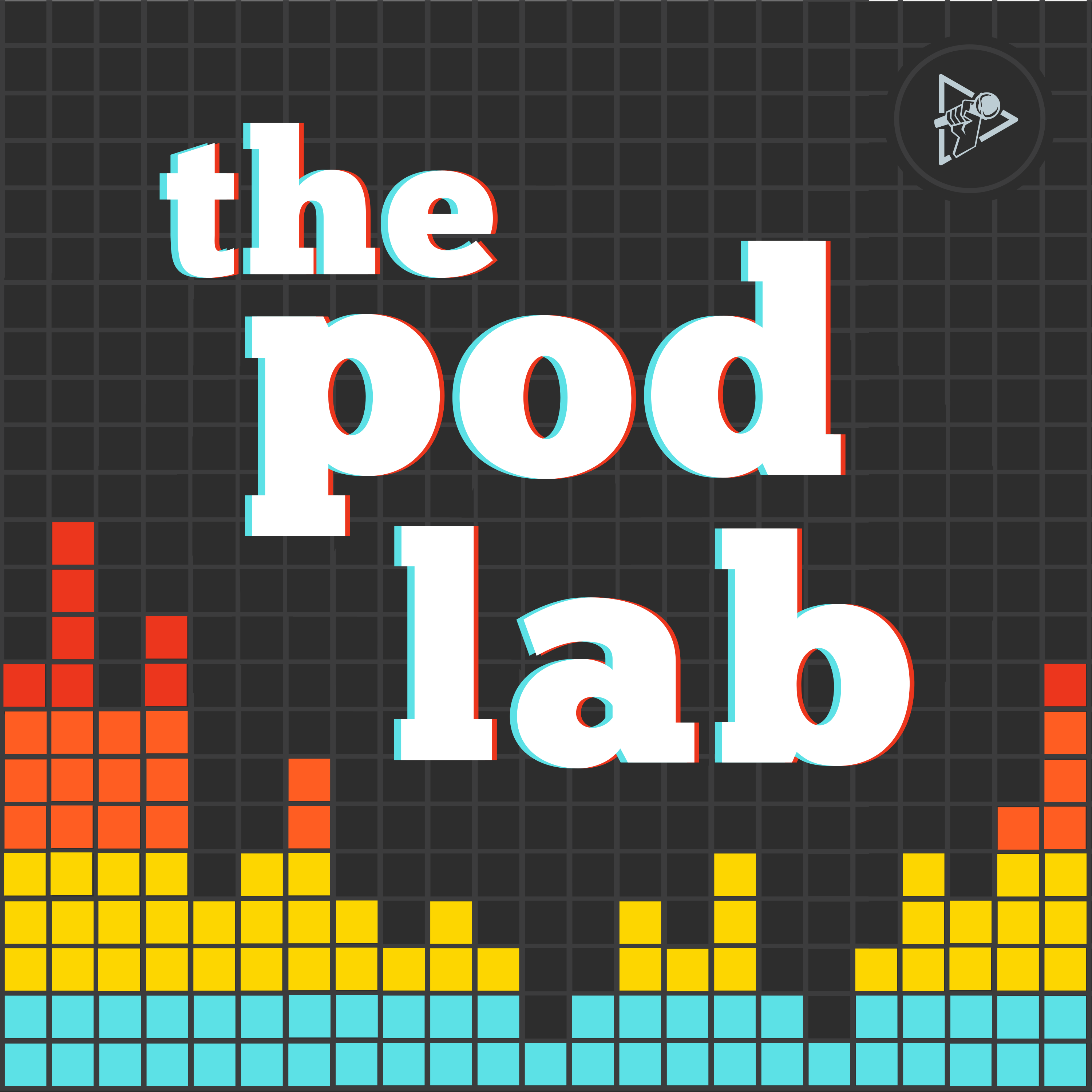Episode 3
Foley and Other SFX + Creative Longevity with Grammar Girl
Today we’re looking at using foley and other types of sound effects to bring your podcast to life. We build a bank robbery scene to dissect sound design layering, scene mapping, and modifying sounds with a high pass filter. Quick, get in the van! Plus, Grammar Girl herself, Mignon Fogarty, stops by to answer a Podcast Movement community question: What's the secret to staying creative with your podcast, episode after episode?
Transcript
This is foley, so is this and this.
Doug Fraser:And this is music.
Doug Fraser:Welcome to The Pod Lab, a Podcast Movement original series.
Doug Fraser:I'm Doug Fraser, producer, and host of the NPR podcast, What We Do.
Doug Fraser:Today, we're looking at using foley and other types of sound effects to bring your podcast to life.
Doug Fraser:Foley is a sound effect technique used to create everyday sounds.
Doug Fraser:So for example, footsteps or the thud of a car door or a knockout punch.
Doug Fraser:Foley artists often use real-world objects to create these sounds.
Doug Fraser:And quite often the items they use are different from the sound that they're portraying.
Doug Fraser:For example, this lovely sound rain is actually bacon frying in a skillet.
Doug Fraser:As you can imagine foley creates a more engrossing experience for your listeners.
Doug Fraser:Now, chances are you won't be going out and spending the time to record the sound of horse hooves on a cobblestone street or anything wild like that.
Doug Fraser:And that's where stock foley sound effects come in handy for everyone from beginners to pros.
Doug Fraser:I won't name any in particular, but a quick Google search will give you some great options.
Doug Fraser:So now that we know what foley is and where we can find it, let's dive into a scene to hear how foley and other sound effects can bring a story to life.
Doug Fraser:Imagine you're creating an episode about a bank robbery, whether that story is fiction or nonfiction, the same lessons are going to apply today.
Doug Fraser:So let's say our robbery duo is a husband and wife team.
Doug Fraser:They'll be our modern Bonnie and Clyde.
Doug Fraser:This is their first robbery.
Doug Fraser:And if all goes according to plan, it'll be their last.
Doug Fraser:So the scene we're going to work on here is in the minute or so leading up to the, everyone get on the ground moment that you always see in the movies.
Doug Fraser:So our challenge here today is to build tension using foley and other sound effects with no music, none at all, not even a moody drone, like this one,
Doug Fraser:Anything and everything that's related to music is off limits.
Doug Fraser:So let's talk story and map out what the scene will look like.
Doug Fraser:So their car pulls into an alleyway, a block or so from the bank, the two will have a conversation in the car and then they'll make their way to
Doug Fraser:Knowing that let's unfold the story along with the foley and other sound effects in real time.
Doug Fraser:Let's head over to the alleyway.
Doug Fraser:This is a city street sound effect I've tweaked just a tiny bit too to make it sound like it's more in the distance.
Doug Fraser:After all we're in an alley.
Doug Fraser:So that rich sound we'd get, if we were on the sidewalk next to what's going on in the city streets is going to be different than what we'd hear,
Doug Fraser:Janet drives into the alleyway and stops the car.
Doug Fraser:At this point we've been on the exterior of the car to establish the location.
Doug Fraser:And now that we're about to move into the conversation, think of it like a camera.
Doug Fraser:So the audio is telling the story from the exterior where we see an establishing shot, and then we're going to move a shot into the interior of the car.
Doug Fraser:When we think of it cinematically, it can help us paint that picture with audio.
Doug Fraser:So again, at this point, we've been on the exterior of the car to establish the location.
Doug Fraser:And now we're going to shift from the exterior perspective to the interior of the car, where our would be criminals, Janet and Marcus are about to have a conversation.
Doug Fraser:And again, this is their first robbery, but Janet has a calm, demeanor she's dialed in and ready to make the score.
Doug Fraser:Marcus, the husband is sweating bullets.
Doug Fraser:He's having second thoughts.
Doug Fraser:I want to manifest his nervousness with some sort of sound effects.
Doug Fraser:So let's have him tap nervously on his worn copy of animal farm.
Doug Fraser:A little object he always carries with him.
Doug Fraser:It's it's basically his safety blanket.
Doug Fraser:We'll have the tapping also act as a red string in the scene.
Doug Fraser:And by that, I mean, it's an element that threads throughout.
Doug Fraser:So if, if this scene had a heart, the book taps would be the pulse.
Doug Fraser:And as tension rises, the tapping speeds up.
Doug Fraser:So Janet asks Marcus what's wrong.
Doug Fraser:After he voices his doubts, she does her best to reassure him by reminding him of the bigger plan.
Doug Fraser:The tapping only gets faster and faster until Marcus snaps.
Doug Fraser:He's out.
Doug Fraser:He doesn't want to do it.
Doug Fraser:This is all just a big mistake.
Doug Fraser:Janet opens the door.
Doug Fraser:Now we want to hear that door open and also close because if we didn't hear it close as listeners, we would presume that it was left open.
Doug Fraser:So unless you want to leave the door open, make sure you add in the sound effect of both the opening and the closing.
Doug Fraser:Now that Janet has closed the door, she is heading for the bank.
Doug Fraser:Eventually Marcus will join her, but for now she's going it alone.
Doug Fraser:Storytelling wise, we have a couple options here.
Doug Fraser:We can jump directly into the interior of the bank and have Janet walk in skipping the walk from the car to the bank altogether.
Doug Fraser:We see this in movies all the time.
Doug Fraser:They're snipping out the boring parts.
Doug Fraser:But the other option is we can let this moment play out in real time by following her from the car all the way inside.
Doug Fraser:In this instance, I actually prefer the latter by following her in real-time, we can offer narration of the moment and even provide her, her thoughts if he want to.
Doug Fraser:And we can help tell that story, plus show the evolution of her panic with foley in sound effects.
Doug Fraser:As Janet begins her walk to the bank door, her thoughts soften.
Doug Fraser:The sharp edges of the world, dole in to a dreamlike state.
Doug Fraser:It's as though her mind is protecting itself from thinking too much about what's coming.
Doug Fraser:So to achieve this transition from very clear audio to, this dreamlike state, you can use what's called a low pass filter.
Doug Fraser:Now, when you apply this effect, you'll likely see an option to adjust the hertz levels.
Doug Fraser:Basically the higher the hertz, the sharper, the sound.
Doug Fraser:Like this.
Doug Fraser:The lower the hertz the more muffled and dream-like the sound becomes
Doug Fraser:This effect also works great if you want your audio to sound like the listener is underwater.
Doug Fraser:So now Janet opens the bank doors and walks inside.
Doug Fraser:She approaches a teller and the teller begins speaking to her, but she can barely hear the voice.
Doug Fraser:Okay.
Doug Fraser:So now we're going to snap her back into focus by quickly increasing the hertz levels of the sound effects to 20,000 and let's layer in a breath as a sort of bridge back to reality.
Sound effect voice:Mam, you okay?
Doug Fraser:"Yes, thank you," she says calmly and pulls out her gun.
Doug Fraser:Okay, let's scratch the idea of her saying "Everybody get on the ground."
Doug Fraser:Right?
Doug Fraser:That's classic, we've seen it a thousand times before.
Doug Fraser:Maybe we can try something a little different here, um, and maybe end with, with a one-liner or something.
Doug Fraser:Um, oh, how about this?
Doug Fraser:So she pulls out her gun and says to the teller, "I'd like to cash this."
Doug Fraser:Okay.
Doug Fraser:That line will work just fine.
Doug Fraser:We'll take it.
Doug Fraser:Now it's time to hear a question from the podcast movement community.
Doug Fraser:This week's question, asker requested to remain anonymous.
Doug Fraser:She asks, "What's the secret to staying creative with your podcast episode after episode?"
Doug Fraser:That is the million dollar question, isn't it.
Doug Fraser:Luckily we have Mignon Fogarty, AKA Grammar Girl here to answer it.
Doug Fraser:Mignon recently celebrated 15 years of her Grammar Girl podcast.
Doug Fraser:She's also the founder of The Quick and Dirty Tips Network, and an inductee into the Podcasting Hall of Fame.
Doug Fraser:That is quite the resume.
Doug Fraser:So let's see what advice she has for staying creative with your podcast over the long run.
Mignon Fogarty:It's a great question.
Mignon Fogarty:It's a grind every week sometimes, but you know, one of the things I did before the pandemic is I would work really hard and get ahead so I could take a long vacation every summer.
Mignon Fogarty:So the three years before the pandemic, I took four or five weeks off every summer and took a big vacation.
Mignon Fogarty:Um, because I'm very deadline driven.
Mignon Fogarty:So I, I can't do it if I'm just staying home and relaxing, like that'll never happen.
Mignon Fogarty:So I need a deadline to get on a plane or a train or somewhere to get away and really get away.
Mignon Fogarty:And that I found out helped a lot in keeping my energy up for the rest of the year.
Mignon Fogarty:Um, you know, you know, eight years, I probably didn't take a single vacation, um, and probably worked weekends too, which was not healthy and I wouldn't recommend it.
Mignon Fogarty:So take a vacation.
Mignon Fogarty:Um, the other thing, um, is having guest writers.
Mignon Fogarty:So I still write about half the segments for my podcast, but bringing in other people to write the other half has just brought in such a fresh
Mignon Fogarty:You know, uh, one of my guests writers found, uh, an entry into a topic using baseball history.
Mignon Fogarty:That is something I would never come up with on my own.
Mignon Fogarty:You know, another woman, um, discovered that in, um, gone with the wind, the line in the book, originally didn't have, "frankly, my dear," it was just my deer.
Mignon Fogarty:And so we used that as an entry to talk about the comma, but after frankly at the beginning of a sentence, so, you know, they just find wonderful things I would never come across myself.
Mignon Fogarty:So that has been a lot of fun working with guest writers.
Mignon Fogarty:And then the final thing that really keeps me energized is interacting with the listeners.
Mignon Fogarty:I mean, I'm sure everyone will say this.
Mignon Fogarty:But, um, you know, getting their voicemails, interacting with them on Twitter and Tik Tok and Facebook and LinkedIn, you know, hearing that my work helps people, it really helps enormously.
Mignon Fogarty:I mean, I don't think I could keep doing it all these years if I didn't hear from people that it mattered to them.
Doug Fraser:When you first started your show, you were doing everything.
Doug Fraser:Is that right?
Doug Fraser:So you were editing, you were doing the whole shebang.
Mignon Fogarty:I was hand coding my RSS feed.
Mignon Fogarty:I did everything.
Doug Fraser:How, during that period where you had so much on your plate at once, did you have anything that you were able to sort of disconnect and keep
Mignon Fogarty:No, I was completely grinding through hoping for the best.
Mignon Fogarty:I felt lucky to get a shower.
Mignon Fogarty:And like I said, I didn't take weekends off for years.
Mignon Fogarty:It was really, really intense at the beginning.
Mignon Fogarty:Um, and, and I, when I look back, I wish I hadn't been so intense that I had enjoyed life more.
Mignon Fogarty:You know, I remember a year where I felt sort of resentful of my own birthday party because it was taking me away from work.
Mignon Fogarty:So, um, and I regret that.
Mignon Fogarty:So I would not recommend that to anyone, but, but it was how, how things kept going in the early days.
Mignon Fogarty:You know, I don't know if I could have been as successful without doing that.
Mignon Fogarty:I'll never know, but, but that's how it went.
Doug Fraser:I know you still enjoy doing the show, but how has the level of happiness changed from the beginning to now?
Mignon Fogarty:You know, I think I'm happier now.
Mignon Fogarty:Um, it, maybe it was a little bit more exciting back then because it was also new and big and, and, and just exciting.
Mignon Fogarty:But now I think about, I think a lot about why do I do what I'm doing and what do I want from what I'm doing?
Mignon Fogarty:And, you know, especially in celebrating the 15th anniversary, I've put a lot of thought into it.
Mignon Fogarty:And, and I think it's feeling like I help people is really the most rewarding thing for me.
Mignon Fogarty:And I'm thinking more and more about how I use, how I can use my platform to help more people.
Mignon Fogarty:For, for example, for the 15th anniversary, I, you know, McMillan was pushing me really hard to celebrate and I found, I just didn't want to talk about myself or even the show.
Mignon Fogarty:And so I decided finally to do a fundraising project for teachers.
Mignon Fogarty:So right now, um, I'm matching donations at Donors Choose, which is a charity that funds teacher's classrooms.
Mignon Fogarty:I'm matching donations up to $7,500 for a week.
Mignon Fogarty:So, you know, that's something that I've never been able to do before.
Mignon Fogarty:And I'm really excited about doing right now.
Mignon Fogarty:And so if you're listening, you, you know, go to donorschoose.org/grammar and use the code Grammar Girl, and I will match your donation to the teacher of your choice.
Mignon Fogarty:So I mean, that, that's a very meaningful thing.
Mignon Fogarty:I think that is something worth celebrating
Doug Fraser:That does it for this week at The Pod Lab.
Doug Fraser:Be sure to subscribe to get notified of new episodes as they're released.
Doug Fraser:And if you'd like to be featured in a future episode, submit your question at the Podcast Movement Facebook page.
Doug Fraser:Until next time, keep experimenting.


